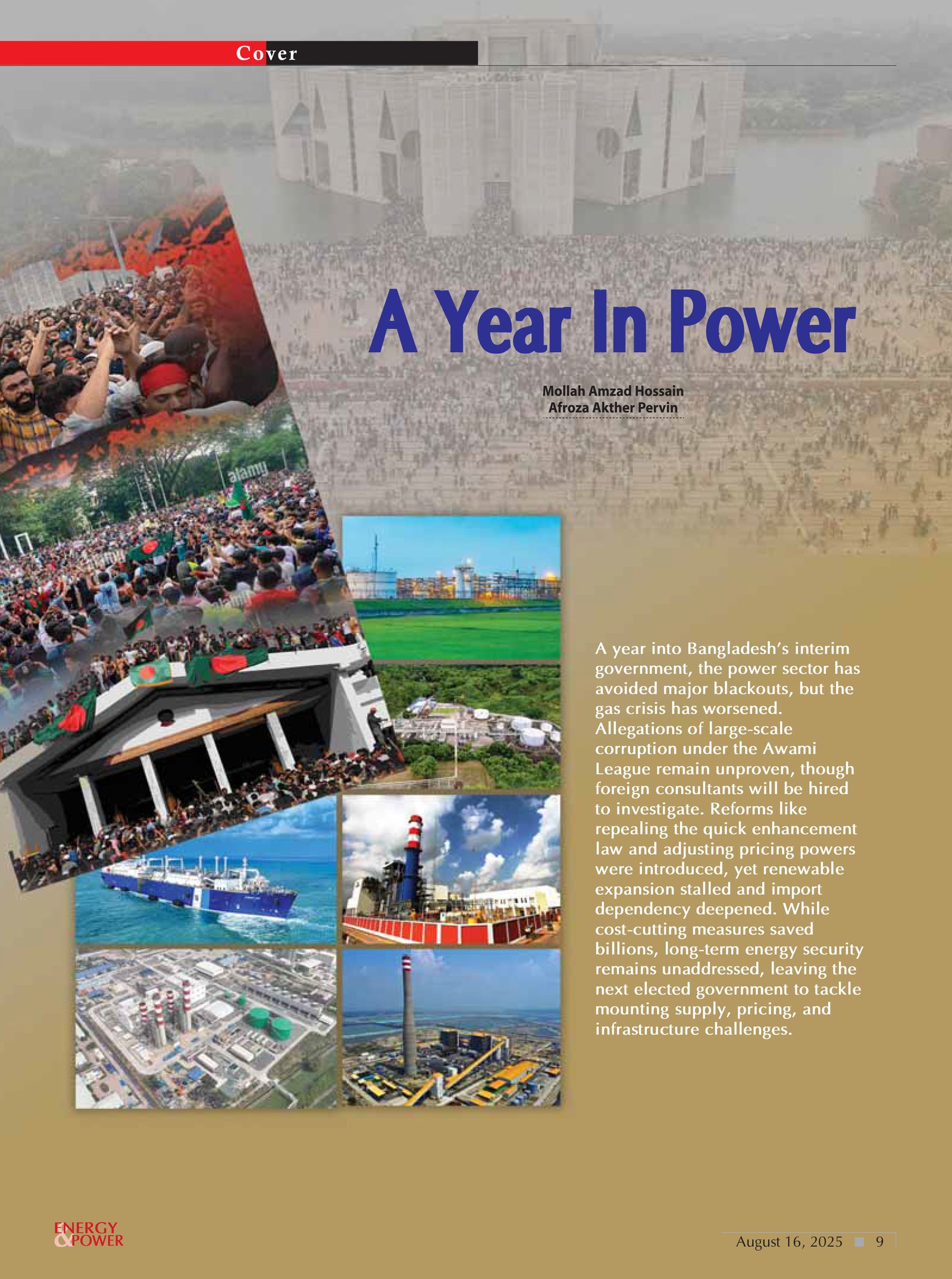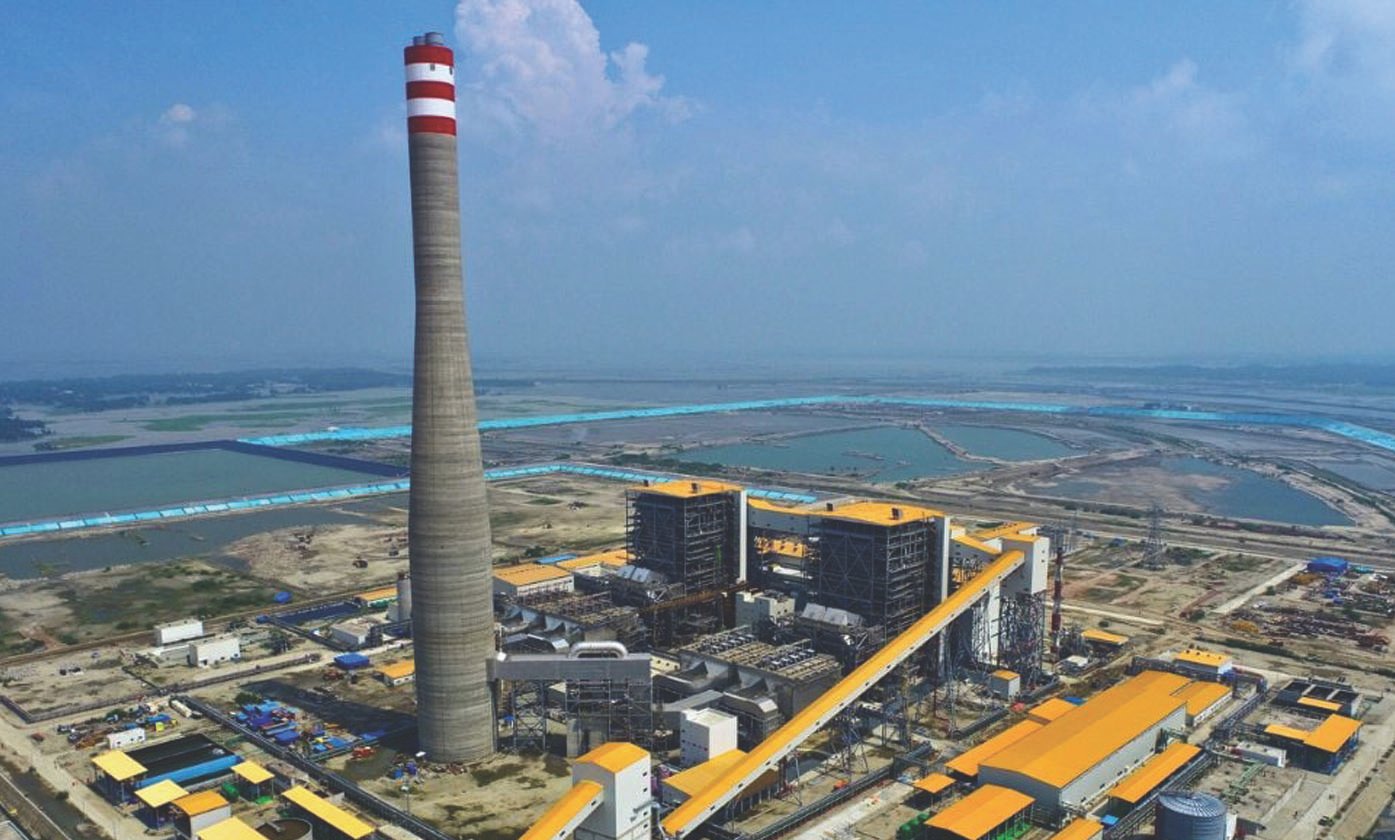
After the Awami League government fell in the wake of the 2024 uprising, an interim administration took charge in a dramatically different political climate. On 7 August 2025, it marked its first year in office — a milestone that has sparked fresh public debate over what it has achieved, and where it has fallen short. Looking back at the past year in one of the most critical areas for Bangladesh’s economy: the power and energy sectors. Over the year, the government managed to keep the lights on without major interruptions — a notable achievement in a country where power cuts have often been a daily frustration. But beneath the steady electricity supply, the energy crisis has only deepened, with the gas shortage becoming more acute.
From the outset, the interim government pledged to bring transparency, root out corruption, and expose the misdeeds of the previous administration. Yet, a year on, the Ministry of Power, Energy and Mineral Resources has not released any conclusive findings to the public. Allegations remain that the Awami League siphoned off billions of taka from the sector over its 15 years in power.
A recent white paper claimed that at least 10% of all spending in the power and energy sectors during that time was lost to corruption and irregularities. It is estimated that the power generation sector alone saw around USD 6.0 billion misappropriated. The committee behind the report urged the government to back up these allegations with hard evidence and to bring in foreign consultants to investigate questionable power plant contracts. That recommendation has now moved a step closer to reality. After a recent Cabinet Committee meeting, Finance Adviser Dr Salehuddin Ahmed announced that a policy decision had been made to hire such consultants — potentially opening the door to the first independent scrutiny of the sector in years.

Reforms
After taking office, the interim government fulfilled a long-standing demand by repealing the Quick Enhancement of Electricity and Energy Supply (Special Provisions) Act, 2010. In addition, the authority to set fuel oil prices was kept with the ministry, while the power to set other energy prices was returned to the Bangladesh Energy Regulatory Commission (BERC). BERC has also taken over the setting of jet fuel prices from the Bangladesh Petroleum Corporation (BPC).
Previously, the positions of chairmen in public-sector power and energy companies were filled mainly from among the secretaries and senior officials of the ministry’s two divisions, raising concerns about conflicts of interest and the lack of transparency and accountability. During the interim government’s tenure, with one exception, former or current secretaries have been appointed as chairmen to all company boards.
Asked for his view on this change, Professor A.K. Enamul Haque, Director General of the Bangladesh Institute of Development Studies (BIDS), said that unless the roles, responsibilities, and accountability of board chairs and members are clearly defined, this reform will not help reduce irregularities and corruption. Former BERC member Engineer Mizanur Rahman argued that appointing people with no sectoral experience as board chairs has not improved accountability and has disrupted normal operations. CAB Energy Adviser Dr. Shamsul Alam dismissed the move outright, calling it “nothing but old wine in a new bottle.”
Clearing Outstanding Dues
Due to financial constraints and a shortage of foreign currency, the Bangladesh Power Development Board (BPDB) and Petrobangla had accumulated massive arrears in the power and energy sectors. This created serious challenges in securing gas from international oil companies (IOCs), LNG and coal from foreign suppliers, and electricity from independent power producers (IPPs).
Over the past six months, the Ministry of Power, Energy and Mineral Resources has gradually cleared outstanding payments, restoring normalcy to the sector. However, payment flows are once again being disrupted, and arrears are starting to build up. The Bangladesh-China Power Company, which operates the 1,320 MW Payra coal-fired power plant, is reportedly owed around Tk 8,000 crore. The company has warned that without immediate payment, it will be unable to import coal, forcing a shutdown. BPDB Chairman Engineer Rezaual Karim said the board is trying to make payments but cannot settle the entire amount at once.
Scan QR Code To Watch Full EP30 Minutes Special
on One Year of the Interim Government
& the Power and Energy Sector

Engineer Mizanur Rahman views the clearing of dues as one of the interim government’s achievements. However, IUB Vice-Chancellor Prof. Dr. M. Tamim noted that while reducing arrears has brought relief to the sector, the credit goes to the Ministry of Finance, not the Power and Energy Ministry.
Power Sector
Since 2022, electricity supply has been disrupted due to difficulties in importing fuel, especially from a shortage of US dollars. This led to load-shedding in 2022, 2023, and 2024, even though generation capacity exceeded demand by 40%. The shortages were most severe during the summer.
Many feared a similar crisis in the summer of 2025, but the interim government reduced arrears and managed to maintain a normal electricity supply from February onwards. If they can meet the extra demand in September’s hot season, no further shortages are expected this year.
Speaking to Energy & Power, Engineer Mizanur Rahman said the Power Division deserves praise for avoiding a major supply crisis, although favorable weather also played a role—this summer’s temperatures were tolerable, with periodic rains cooling conditions. Dr. M. Tamim, however, argued that with generation capacity far exceeding demand, meeting electricity needs was not a major challenge, and paying off arrears meant the government faced little pressure.
Still, Humayun Rashid, President of the Philippines–Bangladesh Chamber of Commerce and Industry and CEO of Energypac, said that while there was no load-shedding in residential and commercial areas, industrial customers—particularly those served by REB’s PBS network—experienced regular outages, disrupting production in grid-dependent factories.
Currently, Bangladesh’s maximum electricity generation remains below 18,000 MW, despite an installed capacity of 27,000 MW. About 2,000 MW is always offline for maintenance, and another 2,000 MW is unavailable due to fuel shortages. Prof. Tamim estimates that at best 20,000 MW can be produced from the remaining 23,000 MW of available capacity.

No new power generation projects were finalized in the past year. By 2029, peak demand is expected to reach 25,000 MW, and by 2030, 26,000 MW. Even with the Rooppur Nuclear Power Plant coming online, shortages may occur. Developing a new power project in Bangladesh typically takes three to four years.
Rooppur Nuclear Power Project Delays
Since 2022, political changes and Western sanctions on Russia have created challenges for the Rooppur Nuclear Power Plant. After August last year, new complications emerged, delaying project completion by two years, although costs will reportedly remain unchanged. The first 1,200 MW unit is now expected to begin trial production in December this year. PGCB has already prepared the transmission line for the plant.
Renewable Energy Expansion
For Bangladesh, there is no alternative to expanding renewable power capacity to achieve an energy transition and reduce import dependency. According to the Integrated Energy and Power Master Plan (IEPMP) 2023, the goal has been set to generate 40% of total power capacity from clean energy by 2041. However, critics have called this plan unrealistic, prompting the interim government to initiate a review of the IEPMP.
On June 16, the Power Division announced the Renewable Energy Policy 2025. Under the new policy, the target is to meet 20% of total electricity demand from renewable sources by 2030, and 30% by 2040. However, sector stakeholders have pointed out ambiguities in these targets. Shahriar Ahmed Chowdhury, Director of the Centre for Energy Research at United International University (UIU), said it is important to clarify whether the 20% and 30% targets refer to installed capacity (MW) or actual energy generation (produced units).
Scan QR Code To Watch Full EP Focus on
One Year of Power Sector Under the
Interim Government: A Reality Check

Following the announcement of the Renewable Energy Policy 2025, the government began taking steps to expand solar power. At a meeting chaired by Interim Government Chief Adviser Prof. Dr. Muhammad Yunus, the National Rooftop Solar Program was announced. This includes instructions to install solar plants on the rooftops of all government buildings, as well as on hospitals, schools, colleges, and all other educational institutions.
However, it has not yet been decided whether the government will invest directly or declare solar “clusters” and lease rooftops with pre-set tariffs for private sector investment. The Infrastructure Development Company Limited (IDCOL) is preparing to launch a rooftop solar program with a capacity of 3–5 kW. The Power Division has also announced a program to install 3,000 MW of rooftop solar by December this year. Still, sector experts believe that this target is unrealistic within such a short period under the current net-metering framework.
In 1996, Bangladesh’s installed power generation capacity was 3,301 MW, rising to 27,424 MW by June 2025. However, due to a lack of focus on renewable energy development, the share of renewables in installed capacity has fallen—from 230 MW in 1996 (entirely from the country’s only hydropower plant), about 7% of total capacity at the time, to just 5.6% today. In terms of actual generation, fossil fuels accounted for 98% of all electricity generated last year, with renewables contributing only 2%.
During the previous government, 37 renewable energy projects were approved under special laws, and Letters of Intent (LOIs) were issued. But after assuming office, the interim government canceled these LOIs, amended the policy, and launched a four-phase open tender process to develop 5,238 MW of solar power at 55 sites. Sources indicate that the tenders received limited responses, with no major domestic or international companies participating. Although not officially disclosed, the tariff rates proposed in the bids reportedly range from 14–15 cents per kWh, whereas previous projects had achieved rates below 11 cents.
Asked whether Bangladesh is on the right track with renewable power expansion, Mostafa Al Mahmud, President of the Bangladesh Sustainable and Renewable Energy Association, said that canceling the LOIs has undermined investor and lender confidence. The changes in implementation agreements and bidding processes have created uncertainty in the sector. Prof. Tamim said that without guaranteed returns, investment in this sector will not materialize. However, Engineer Mizanur Rahman argued that if the Power Division were to identify suitable land, develop it, install transmission lines, and then hold auctions, very competitive tariffs could be achieved. He added that if this approach had been adopted over the past year, success could have been achieved much more quickly.
Energy Sector
While the government has shown some success in managing the power sector, the supply of primary energy—especially natural gas—has become even more fragile compared to last year. Domestic production capacity is declining due to delays in new drilling, and the supply of domestic gas continues to fall. Last year, LNG imports covered 60% of the country’s 1,100 MMCFD LNG handling capacity. This year, despite increasing LNG imports to 70% of capacity, Petrobangla is still struggling to meet demand.
Currently, drilling is underway for 150 wells, including new exploration and the refurbishment of existing ones. So far, 19 wells have been completed, adding 80 million cubic feet of gas to the grid. Under the previous Awami League government, 16 of 50 planned wells were awarded to three companies under special laws. The current government has continued with two of those projects but canceled 14, delaying drilling by about eight months. New tenders and contract signings are now in progress.
The previous government had signed a contract with Summit for a third Floating Storage and Regasification Unit (FSRU) to expand LNG import capacity, but the interim government canceled it. A term sheet with US company Excelerate Energy for a fourth FSRU was also canceled, as were ongoing talks with two companies for RLNG imports from India. Over the past year, no progress has been made on issuing new tenders for FSRU development. However, the government has decided to implement the Matarbari onshore LNG terminal project under a Public-Private Partnership (PPP) model.
Prof. M. Tamim said the gas supply situation has worsened and that even with available funds, Bangladesh lacks the infrastructure to import enough LNG to solve the problem, meaning the crisis will deepen in the coming years. Former BUET Dean Prof. Dr. Ijaz Hossain noted that Petrobangla has effectively informed industries and entrepreneurs that gas supply cannot be guaranteed, and the shortage will continue to grow.
Under the previous government, Production Sharing Contracts (PSCs) for offshore bidding had been finalized, with December last year set as the submission deadline. No companies submitted bids. Indian company ONGC is also leaving two offshore blocks it had been working on. Petrobangla has updated the offshore PSC and drafted the onshore PSC, which is now awaiting approval from the Energy Division. However, it is unlikely that bidding for oil and gas exploration will take place before the upcoming February elections.
The interim government also organized a special meeting on the prospects and challenges of coal resource development. Most experts at the meeting recommended domestic coal extraction and utilization. However, the Energy Adviser stated that the interim government would not make any decisions on domestic coal mining, though they plan to leave a set of recommendations for the next government.
Cost Savings as a Priority
The interim government has continued to emphasize cost savings as a way to reduce expenses in the energy sector. The International Monetary Fund (IMF) has been pressing for a reduction in subsidies in the power sector. The previous government responded by repeatedly raising prices. The interim government, on the other hand, has focused on cost-cutting measures. On the occasion of its one-year tenure, the Power Division and the Energy Division each prepared separate reports highlighting their achievements. These reports showcase savings made by reducing expenses. According to the ministry, changes in the import and procurement process have increased competition, leading to reduced costs in various areas.
The Energy Division claims that abolishing special provisions and increasing competition in LNG procurement saved Tk 302 crore. They expect even greater savings in the current fiscal year. In fuel oil imports, Tk 7,000 crore was saved in FY 2024–25 compared to the previous year. By signing new gas sales agreements with KAFCO, a Fertilizer Factory, and Lafarge Cement, the government will earn an additional Tk 1,000 crore annually in revenue. Reducing system losses generated Tk 218 crore more in revenue, while increasing industrial gas prices will add Tk 98 crore.
Experts note that while government initiatives to increase competition have indeed lowered costs in many cases, global factors have also played a role. Over the past year, international prices for fuel oil and LNG were lower than the previous year. Global shipping costs for energy transport also declined. Engineer Mizanur Rahman pointed out that although the government’s initiatives were positive, the fall in international prices of oil, LNG, and coal significantly contributed to cost reductions.
The Energy Division also stated that to increase domestic gas production, it has begun implementing a plan to drill and refurbish 150 wells, boosting BAPEX’s capacity by purchasing three new rigs. Work on 19 wells has been completed so far, and cost reductions in 10 gas sector projects have saved Tk 328 crore.
The Power Division’s report highlights that reducing the service charge for private power plants’ fuel oil imports by 4.0% will save Tk 470 crore. Increasing the oil import volume per ship from 15,000 to 20,000 tonnes will save Tk 354 crore. Setting the price for electricity from the Matarbari power plant at Tk 8.45 per unit will save Tk 2,500 crore annually. The division has also initiated tariff reductions for other power plants, aiming to save Tk 2,630 crore by lowering tariffs in government-owned plants. Additionally, measures such as reducing facility rents, collecting overdue charges (fines), and other activities aim to generate Tk 9,210 crore in revenue.
Savings amid Rising Subsidies
Petrobangla reports that it has incurred losses since LNG imports began and has required annual government subsidies. In FY 2018–19, when LNG imports started, the subsidy stood at Tk 2,500 crore. As imports increased, so did subsidies, reaching Tk 8,900 crore in the last fiscal year, compared to Tk 6,000 crore the year before.
In the power sector, the subsidy allocation for the last fiscal year was Tk 47,000 crore. Considering the deficit, the revised budget increased it to Tk 62,000 crore. However, the Power Division says the figure will decline in the current fiscal year (2025–26), with Tk 37,000 crore allocated. Last year, the target was to save Tk 11,444 crore by cutting costs by 10%. From August to May, Tk 1,500 crore in savings was achieved. Shutting down 10 private power plants after their contracts expired saved Tk 525 crore.
The Power Division claims that summer load-shedding was avoided through advance planning. Domestic arrears of Tk 1,728 crore have been cleared, and $152.6 million in foreign dues have been paid. Adani’s outstanding payment has been reduced from Tk 7,934 crore to Tk 2,363 crore.
Remarks from the Power and Energy Adviser
Muhammad Fouzul Kabir Khan, Adviser on Power, Energy, and Mineral Resources, told journalists that the problems in the power and energy sector cannot be solved in one year. While an uninterrupted power supply was ensured during the summer, the gas crisis cannot be solved overnight. Building the necessary infrastructure would take at least three years. However, the government has maximized LNG imports to meet industrial gas demand and emphasized gas exploration and production.
Regarding rental power plants, anti-corruption measures, canceling or amending controversial power plant contracts, and disputes with Adani, Khan said there has been progress. Committees are working on these issues, and discussions to lower electricity prices through contract amendments are ongoing. Talks with Adani have also progressed, though final results are not yet visible to the public. “A lot is happening behind the scenes,” he said, “but it will take time.”
Conclusion
Bangladesh now relies on imports for 55% of its total energy and electricity needs — and that reliance is growing. Over the past six years, the taka has lost 40% of its value against the US dollar, making imports even more expensive. For now, global prices for gas, oil, LPG, LNG, and coal are relatively low, but the calm could be short-lived. Any flare-up in Middle East tensions or a prolonged Russia–Ukraine war could send energy markets into fresh turmoil.
For more than 15 years, experts have warned about the dangers of building a power and energy sector heavily dependent on imports. Successive Awami League governments failed to act on those warnings. The result: even after pouring Tk 70,000 crore in subsidies into the power and energy sector in FY 2024–25, the country is still struggling with losses and rising prices. The recent gas price hike has hit industries hard, particularly the export-oriented garment sector, where production is suffering due to inadequate supply.
When the reform-minded interim government came to power, many expected bold moves to explore domestic gas and coal reserves and to accelerate renewable energy development. These steps could have eased import dependence and strengthened energy security. While some initiatives have been launched, quick results are unlikely. If they had been started in earnest, the next elected government would have had a stronger base to build on.
For now, the Ministry of Power, Energy, and Mineral Resources has focused on day-to-day measures: improving management, investigating corruption, and cutting costs. But it has yet to take decisive action to secure the country’s long-term energy future — a fact the energy adviser himself has admitted. This means that whoever forms the government after the February elections will inherit an energy sector facing some of its toughest challenges yet.
Download Cover As PDF/userfiles/EP_23_05_Cover.pdf



